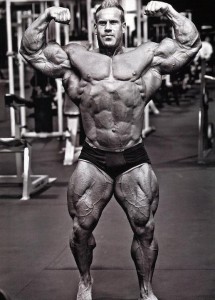This last week I had a new column up at LitReactor, but as I wrote it, another issue came to mind.
The man above is the one who inspired the article. That’s Jay Cutler. Not to be confused with the football player. This Cutler is a multi-Mr.-Olympia winner, champion bodybuilder, and widely respected in the bodybuilding world as an authority.
My question to you: Did you look at that picture and think, “EEEwww”? Or something about how that’s gross or unnatural? And what would you say if depicted above you saw a female bodybuilder?
This is all to say, for whatever reason, I think we talk a lot about body shaming, but I don’t think we’ve really explored the darker, spray tanned corners of that idea or what it means.
For starters, let’s apply some of the arguments that one might use to body shame bodybuilders, and let’s apply the logic that dismisses those arguments in other contexts.
Before we begin, let me get something straight. I do not care whether or not someone is fat or skinny or has any kind of body that falls inside or outside what passes in the range for normal. I’m not going to have sex with many people when considering the vast population of the world, I’m not a recruiter for a gymnastics team, and frankly I’ve met skinny people who are jerks and fat people who are jerks. I’ve met a lot of jerks, and also a lot of nice people, and there doesn’t seem to be a correlation between weight and niceness, to me anyway.
Argument: It’s unnatural.
It totally, 100% is unnatural. I’ll counter with a very simple question: Do you have any idea how many people have extensive dental work done? Like, any inkling? Just google around about celebs and their original teeth. A person’s original teeth, those are natural. What you see flashing on screen, that is not. And you can say that fixing one’s teeth is different, and I would agree, but now we’re not talking about whether or not something is natural, we’re talking about whether or not it’s a good choice. That’s a different discussion.
Argument: It’s unhealthy.
Perhaps. I doubt you’ve done a lot of studying on the effects of, I’ll say it, steroids. It would probably be wise to look into that first. But more to the point here, that’s the same argument used to shame fat people. That it’s unhealthy, that an unhealthy person is a greater economic burden, and that therefore it’s everyone’s business. That may or may not be true. I don’t honestly know. What I do know is this: I pay a fortune in insurance premiums for health care, and I’ve been to the doctor exactly three times in the last decade, so fuck off with this economic burden nonsense (for the record, my work’s health care plan is more expensive than it was prior to the Affordable Health Care Act, and I do not mind).
Argument: It’s gross.
The classic way to stop a lot of body shaming is to say, “Remember, this person was not put here to please you.” You don’t like the bodybuilder body. That’s cool. Nobody is forcing you to caress anyone here. It’s not a personal attack when someone who would make a displeasing sexual partner for you exists in the world.
Argument: It’s on purpose.
This one, to me, is the silliest. I guess it follows the supposition that most people just look how they look and do nothing to alter or go with or change that. That nobody cultivates a look. Tattoos are on purpose. Gauged ears are on purpose. Dyed hair is rarely an accident.
Argument: It’s body obsession.
Hey, your body is your body. I believe people should be able to do what they like with their bodies so long as they aren’t hurting anyone else. I think there’s a way to be a bodybuilder and have a healthy relationship with food and exercise, just the way it’s possible for a skinny person or a fat person. When you say someone else is obsessed with his or her body, you’re assuming not the fact of what’s going on, but how an individual FEELS about it. And that’s wrong.
Argument: It sets up an unrealistic standard.
If this was anywhere near the standard, that point would be a lot stronger. I don’t think anyone considers this remotely the standard. It sets a somewhat baffling outer border of body types, but to say that it sets the standard, that’s like saying Robert Wadlow sets unrealistic height expectations for men.
*
Hey, just remember. It’s called body shaming. Not Fat Body Shaming or Skinny Body Shaming or Falls Within Accepted Norms Body Shaming. There are people with bodies, and if you can’t help but say disparaging things about their bodies, then you’d probably better do a little re-examination on the issue.

